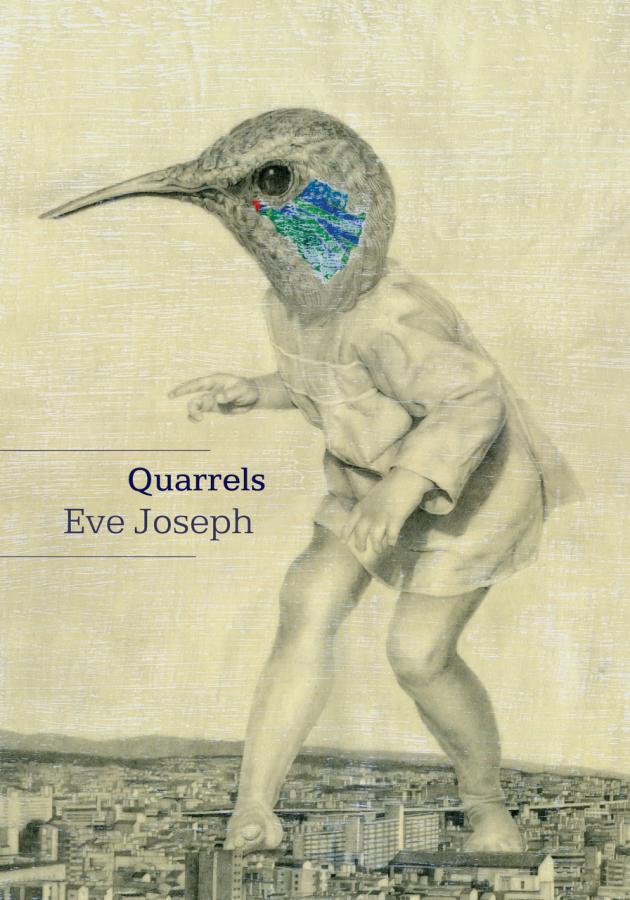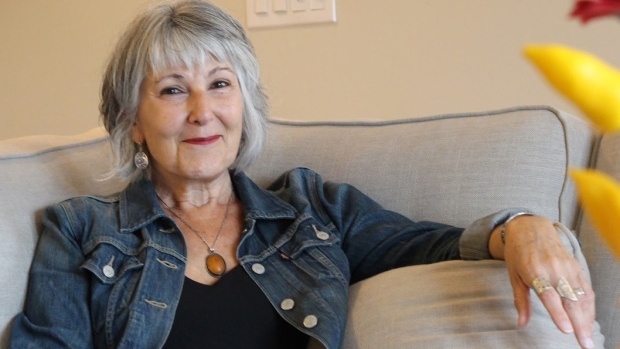Room Magazine’s Isabella Wang talks to Eve Joseph about Quarrels (Anvil Press, 2018), the 2019 winner of the Griffin Poetry Prize.
Eve Joseph’s two books of poetry, The Startled Heart (Oolichan, 2004) and The Secret Signature of Things (Brick, 2010) were both nominated for the Dorothy Livesay Award. Her nonfiction book, In the Slender Margin was published by HarperCollins in 2014 and won the Hubert Evans award for nonfiction. The book was named one of the top 100 picks of the year by the Globe and Mail.
Eve’s book of prose poems, Quarrels (Anvil Press, 2018), was awarded the 2019 Griffin Poetry Prize at a ceremony in Toronto on June 6th.
ROOM: Hi Eve! First off, CONGRATULATIONS! We are here to celebrate your winning the Griffin Poetry Prize. How does it feel? What does celebration mean to you?
EJ: Thanks Isabella! It feels pretty incredible as you can imagine.
There is much to celebrate these days. At the heart of it, for me, is the joy in gathering with the people I love. My mother was so good at celebrating others. She sent me flowers whenever there was an occasion to celebrate . . . and sometimes she just sent them because she knew what pleasure it gave me to receive them. She taught me that you don’t need a reason to celebrate.
ROOM: It has been such a pleasure to read your book. This collection of prose poems kept me on the edge of my seat, where every line is a poem on its own—totally refreshing. Would you like to speak a bit more about how this project first started?
EJ: I wasn’t thinking of a project or a book when I started writing these poems. I was completely engaged in trying to figure out the form. The more prose poetry I read, the more I was drawn to its strange and surreal possibilities. Over time, I accumulated a number of poems which seemed to catch the spirit of the form and it was then that I began to imagine a book. I prefer to write without a “project” in mind. To try to remain open to whatever presents itself and to pay attention to where the work wants to go and not where I want to take it.
ROOM: I love the quote you begin with, the one by W.B. Yeats about making poetry out of “the quarrel with ourselves.” Indeed, there seems to be a disruption with the poems as you take us down the unexpected—the pairing of what would normally be viewed as illogical. Yet, the way the poems come together says something so intrinsic about the way that art, and poetry are constructed in the everyday. Would you like to speak more to that? Did any of these poems surprise you?
EJ: The Field Guide to Prose Poetry opens with the quote: “The appeal of the prose poem is in the attraction of a little world made out of everyday materials.” So, you are absolutely right that poetry is constructed out of the ordinary details of our lives. The form itself made me think about some of the stranger things that had happened in my life (a capon sticking in the kitchen ceiling, a wringer washer that barked like a baby seal) and allowed my imagination to fill in the rest. The “starting point” was always the real: these poems aren’t fabrications. What amazed me, time and time again, was how the surreal exists just below the real in our lives. I love that. It’s connected to the idea that the metaphorical truth is much more interesting than the literal truth.
One of my “markers” of success is whether or not I’m surprised by a poem. I think it was Robert Frost who said: “no surprise in the writer, no surprise in the reader.” I had no idea, when I started a poem, where I would end up.
ROOM: I would love to hear more about your process, how these poems came to be: Did you know where to begin or end? Where did these lines come from, and how did you know where to weave them in?
EJ: Most of the poems did not come easily. I would often start with a line only to have it lead nowhere. It felt as if I were striking a flint but nothing would catch. My biggest obstacle was myself. I had to learn to play with language in ways I had not done before. I had to think associatively and to let lines sit in close proximity to each other without them having a narrative connection. Prose poetry invites contradiction: it looks at one thing and asks you to look at its complete opposite. It’s in the juxtapositions—the placing of unlikely things beside each other—that a tension and energy can sometimes be found.
 ROOM: Let’s talk about the rhythm of the everyday—you have a fine eye for noticing the falling of leaves, a boy in the photos, lasagna and black cherry soda. As well, the poems also speak to larger matters such as war crimes and surveillance. Considering how prose poems have such a distinctive rhythm of their own, do you think that they help to accentuate the way we notice or contemplate things in the everyday?
ROOM: Let’s talk about the rhythm of the everyday—you have a fine eye for noticing the falling of leaves, a boy in the photos, lasagna and black cherry soda. As well, the poems also speak to larger matters such as war crimes and surveillance. Considering how prose poems have such a distinctive rhythm of their own, do you think that they help to accentuate the way we notice or contemplate things in the everyday?
EJ: I think all poetry is related to keen observation—of the world around us, of our internal lives. It asks that we pay attention and that we find language that names things as accurately as we can. I am very interested in how prose poetry is a “bridge” between prose and poetry. It is neither one nor the other. This won’t be true for everyone but, in my experience, writing prose has to do with following “thought” as far as I can. Thinking to the end of a line. Poetry, on the other hand, is quicker, more associative. It flits from branch to branch. I love how those two things . . . the longer line of thought and the truth of the quick, instantaneous observation, find a home together in the prose poem. A direct answer to your question would be to say that prose poetry encouraged me to notice and contemplate how strange our ordinary lives are.
ROOM: I’d love to hear what you are currently reading these days—any books, poems, authors you’d like to give a heart-warming shout-out to?
EJ: I’m always reading a hodgepodge of things: I’ve recently loved: White Fragility by Robin DiAngelo, Between the World and Me by Ta-Nehisi Coates and Go, Went, Gone, by Jenny Erpenbeck. All important books for the times we find ourselves in today.
I’m dipping into Carsten René Nielsen’s new book of prose poetry, Forty-One Objects, translated from Danish by the American poet, David Keplinger, whose new book of poetry, “Another City,” I’m about to begin.
And I just finished Carolyn Forché’s memoir What You Have Heard is True. An utterly remarkable read.
ROOM: So much is on the horizon. What are you most looking forward to?
EJ: Struggling with poetry once again!
ROOM: Thanks so much for taking the time to chat with me, Eve!














